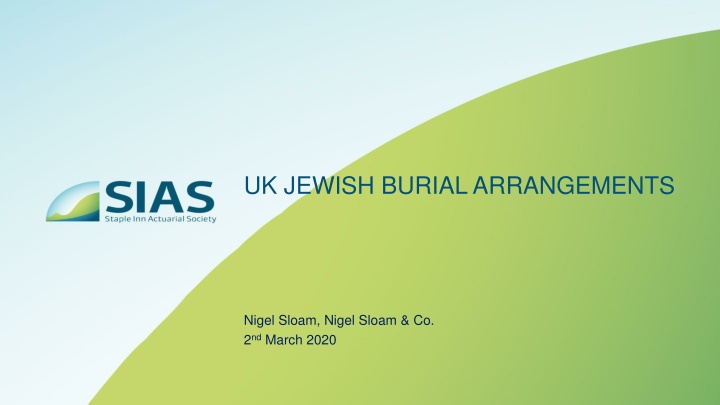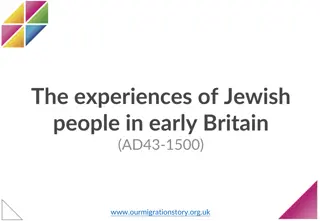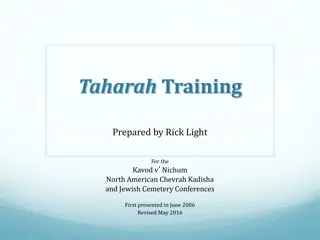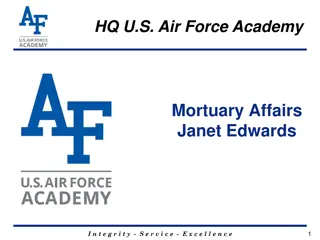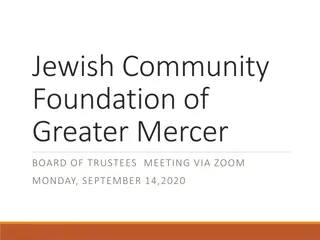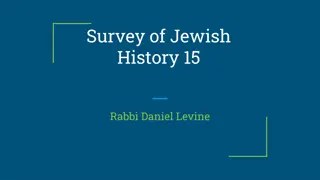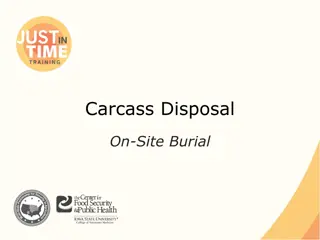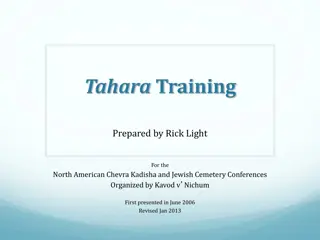UK Jewish Burial Arrangements Overview
UK Jewish burial arrangements involve multiple societies representing various Jewish denominations and localities to ensure religious burials. Membership entails funeral scheme subscription and financial integration with community funds. Regulatory guidance often overlooks these faith-based plans, which are mirrored in other faith communities. Life assurance benefits are provided, with no explicit need for actuarial advice historically.
Download Presentation

Please find below an Image/Link to download the presentation.
The content on the website is provided AS IS for your information and personal use only. It may not be sold, licensed, or shared on other websites without obtaining consent from the author.If you encounter any issues during the download, it is possible that the publisher has removed the file from their server.
You are allowed to download the files provided on this website for personal or commercial use, subject to the condition that they are used lawfully. All files are the property of their respective owners.
The content on the website is provided AS IS for your information and personal use only. It may not be sold, licensed, or shared on other websites without obtaining consent from the author.
E N D
Presentation Transcript
UK JEWISH BURIAL ARRANGEMENTS Nigel Sloam, Nigel Sloam & Co. 2ndMarch 2020
Outline Basics Membership Financial Structure Regulatory Environment Professional Aspects 2
Basics Many different UK Jewish burial (funeral expenses) societies - nationally and provincially - representing different groups/denominations/localities - providing benefits for well over 100,000 members or families - some have been in existence for 200 years - their existence was generally unknown to the wider profession until a few years ago. Run for community (or affiliated communities) - to ensure religious burial on standard basis - varying religious requirements - non-commercial, not-for-profit Most own and maintain and develop burial grounds - some lease from other groups or local authorities Orthodox Jews are only buried, Reform Jews either buried or cremated 3 Some organisations provide free charitable burials
Membership Funeral scheme subscription normally requires membership - of community - rarely available on stand-alone basis Funeral scheme membership lapses with main membership - relatively few surrender values - no transfer system in play - but sometimes can pay a single premium Membership fees not normally age related - new joiner fee between ages 35-75 fairly common - premiums payable throughout life Eligible non-members can pay for funerals when needed - rate often set to create surplus to subsidise scheme expenses 4
Financial Structure Finances often integrated with community funds - not always set up as separate trusts Often benefit from communal charitable status - rely on tax exemptions Fees usually paid annually - part of or in addition to main membership Some schemes offer advance payment option - in part or in full Additional income from tombstone levies 5
Regulatory Environment Guidance geared towards commercial plans these schemes were ignored! - Non-mandatory guidance ( Guide for Actuaries on UK Trust-Based Pre-Paid Funeral Plans ) - Actuarial Profession Standard Z1 ( Duties and responsibilities for actuaries working for UK Trust-based Pre-Paid Funeral Plans ) - Technical Actuarial Standard 400: Funeral plan trusts (consultation opened 19 February 2020 on changes) - all framed without apparent knowledge of existence or operation of these faith based plans Mirrored in other faith communities who are now taking first steps to incept similar schemes Life Assurance style benefits provided - historically no explicit requirement for actuarial advice - but leading counsel thought that these were subject to former insurance legislation No consensus that faith based schemes might fall subject to regulation - the parties involved long under impression or hope - that exempt from regulation - by virtue of being not-for-profit 6 Recent discussions with FCA indicate that this could be wrong
Professional Aspects FCA/Treasury have suggested that these schemes may need to be regulated - by FCA and/or PRA - or otherwise need to meet specific criteria for exemption Actuaries are invited to advise intermittently in most societies - not necessarily at regular intervals Some actuarial involvement has been on pro-bono basis - by community members under some communal pressure - who may not have recognised professional responsibilities and may be inexperienced Data generally poor Some communities are inherently difficult to regulate and are immune to advice! 7
Disclaimer The views expressed in this presentation are those of the speaker, Nigel Sloam and not necessarily of the Staple Inn Actuarial Society
